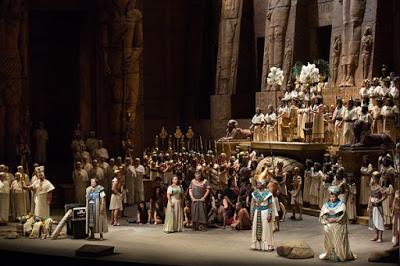Verdi's "Egyptian business" complete with a huge chorus and real horses.
by Paul J. Pelkonen

Rush hour in Egypt: the triumphal scene from Act II of Aida.
Photo by Marty Sohl © 2014 The Metropolitan Opera.
The Metropolitan Opera is offering three leading ladies and two different conductors in its latest revival of Aida, at once Verdi's grandest and most intimate opera.
What is Aida?
Aida stands at the very end of of Verdi's life as a regular working composer, coming right before the long retirement of 18__-18__, a silence that was ended with the revision of Simon Boccanegra and the great success of Otello. In its four acts, Verdi created a very Italian version of Grand Opera, combining onstage spectacle with a small, tender story about a love triangle and two countries locked in a violent (and ultimately pointless) war. Oh and did we mention it's set in Egypt?
What's Aida about?
Amneris, the daughter of the Egyptian pharoah, loves the army's general Radames. Unbeknownst to everyone, he is secretly in love with the slave Aida. And to make things even more interesting, Aida is the daughter of Amonasro, the king of Ethiopia and Radames' formidable opponent in battle. Everything comes to a head when Amonasro is captured, and persuades Aida to get Radames to betray the Egyptian army. Radames is arrested and sentenced to entombment. Aida hides in the tomb, and the opera ends with the lovers literally running out of air as Amneris, kneeling in the temple prays for peace.
Why should I go see Aida?
There are two types of people who go see Aida at the Met every couple of years. One, is the new opera goer who has tickets for a grand night out and wants to experience the spectacle of the exhibits in the "other Met" (the museum across Central Park) coming to vivid life thanks to the heroic efforts of the Met costume, set and prop departments. The other is the veteran opera lover who keeps coming back to Verdi's sweet melodies, rousing choruses and deeply serious meditation on the futility of war between nations. This is one of his crowning achievements, a grand opera in the old style that managed to break new ground at the same time.
Who's in it?
The first performances (Nov. 5-19) feature Liudmila Monastyrska returning to the title role. Latonia Moore takes over through Dec. 2. Both sopranos will sing opposite mezzo Ekaterina Gubanova and tenor Marco Berti as Radames. Mark Delevan lends his imposing bass to Amonasro. under the baton of Marco Armiliato. The second cast arrives March 23, 2017, and features Krassimira Stoyanova, Violeta Urmana and tenor Jorge de León caught in the middle, with George Gagnidze as Amonasro. Daniele Rustioni conducts the spring performances.
How's the production?
This staging has been a stalwart at the Met since it made its debut way back in 1989. https://super-conductor.blogspot.com/2010/01/dvd-review-aida-from-met.html (I was there.) It combines imposing trompe l'oeil sets, all-white costumes and clever lighting to create the illusion that the vast Met stage is the even bigger canvas of Ancient Egypt at its height. Thanks to the requirements of Live in HD there have been a few changes made here and there (the priests now wear white helmets instead of the old bald-caps) but for the most part it hasn't changed much. This is a good "starter" opera for anyone, and a fun one to take your friends to just to watch their eyes pop at the start of the Act II Triumphal March.
When does the show open?
The first performance of Aida this season is Nov. 5. The spring run starts on March 23 with an all-new cast and conductor.
Where do I get tickets?
Tickets are available through MetOpera.Org or by calling the box office at (212) 362-6000. You can save service fees by going to the box office in person at the Met itself, located at 30 Lincoln Center Plaza. Hours: Monday to Saturday: 10am-8pm, Sunday: 12pm-6pm.
Which recording should I buy?
As one of the most popular of Verdi's operas, Aida has been recorded a lot. Placido Domingo sung the role of Radames three times on disc, and Leontyne Price laid down the opera twice. Here are some solid recommendations:
Vienna Philharmonic cond. Herbert von Karajan (Decca, 1959)
This was the first stereo recording of Aida. It's still the best. Renata Tebaldi and Carlo Bergonzi are perfectly matched as the lovers. Karajan was at a peak with his Vienna forces, and although he recorded the opera again for EMI, that set was hurt by a cast which could not hold up against the conductor's patented orchestral assault. Carlo Bergonzi shows why he was one of the finest tenors of the 20th century, and Renata Tebaldi is unsurpassed in the title role. The classic.
Rome Opera Orchestra and Chorus cond. Sir Georg Solti (Decca, 1962)
Leontyne Price recorded the role of the Egyptian princess twice. This was her first version of the opera, recorded prior to her Met debut in the role. She is surrounded by a strong cast, featuring Jon Vickers, Rita Gorr and Robert Merrill as Amonasro. Georg Solti conducts the Triumphal Scene as if it were a Bruckner symphony, with trumpets squarely to the fore. This set is a strong alternate with starry casting.
Orchestra and Chorus of the National Academy of Saint Cecilia cond. Sir Antonio Pappano (WBC, 2015)
This recording, laid down in February, 2015, captures the intimacy of this opera in a slow, measured account that sprawls over three generous discs. Tenor Jonas Kaufmann comes to Radames with a clean and pleasing, vaguely Italianate timbre and a secure lower register. Anja Harteros is well cast as Aida, singing the part of the distressed girl with careful guidance from the pit and a sure command of the vocal line. A modern alternative.

